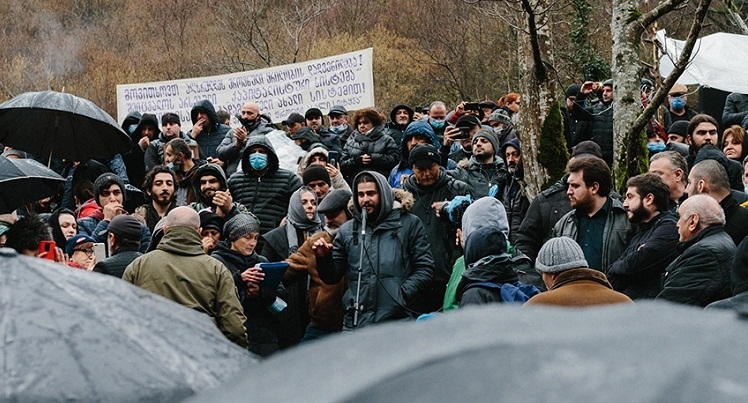168-day protest against Namakhvani HPP continues in Gumati village after police remove protesters’ tents

The opponents of the Namakhvani HPP may hold a large rally in Tbilisi. Photo: For Fair Energy Policy NGO.
Locals who have been protesting the construction of Namakhvani HPP for 168 days by Turkish company ENKA are now holding a rally in the village of Gumati, Imereti region after police dismantled their tents in the village of Namakhvani yesterday ‘due to possible threats of flooding.’
A solidarity rally is also scheduled by organizations such as the Greens, For Fair Energy Policy NGO and Social Justice Centre in the capital Tbilisi, in front of the administration building of the government of Georgia, at 16:00 today.
The demonstrators and the NGOs have accused the government of signing a ‘cabal agreement’ with Turkish company ENKA and giving an early approval to the company to start construction without studying the possible side effects.
A leader of local protesters Varlam Goletiani stated yesterday that the ‘government uses all dirty methods’ to hamper the peaceful demonstration and allow the Turkish company to build the HPP which may cause ‘devastating results’ for the Rioni Gorge and the whole western Georgia.
 Goletiani has stated that 'government knows our protest is sincere, they should act reasonably.' Photo: Mtis Ambebi.
Goletiani has stated that 'government knows our protest is sincere, they should act reasonably.' Photo: Mtis Ambebi.
He said that they refrain from holding a large rally in Tbilisi which may further worsen the situation in the country and ‘benefit the country’s enemies.’
Goletiani has urged the government to act reasonably and not make people take to the street in the country’s capital as it happened in Kutaisi at the end of February 2021.
What do we know about the controversial HPP?
Turkish engineering company ENKA (90 per cent of share) and Norway’s Clean Energy Group (10 per cent share) won the Georgian government tender back in 2019 to build, own and operate the Namakhvani project.
The cost of the project is 800 million USD (2.66 billion GEL) and it covers the construction of two HPPs along the Rioni River with a capacity of 433 MW and an annual output of 1,514 GWh.
The government of Georgia has transferred 600 acres of state-owned land to the Turkish construction company ENKA for a symbolic price.
The protesters and the local environmental NGOs say the project was signed behind closed doors and without the involvement of public and NGOs.
They argue that the government 'deliberately signed the anti-state project’ without the public involvement in discussions.
 Economy Minister Natia Turnava says that 'Namakhvani HPP is crucial for Georgia.' Photo: BMG.
Economy Minister Natia Turnava says that 'Namakhvani HPP is crucial for Georgia.' Photo: BMG.
Georgian Young Lawyers Association (GYLA), Green Alternative, and EMC NGO say that ENKA has launched preparatory works on the site in February 2021 without providing up to 25 studies on the project’s impact on the environment.
They say that the ‘cabal agreement’ allows the investor to confiscate private property and utilize natural resources and demand unproportionally high compensation from the Georgian state for damages.
The government of Georgia says that the project ‘is of utmost importance for Georgia’s energy independence’, with 800 million USD investment and the potential to employ at least 1,800 Georgian citizens.
Georgian Public Defender Nino Lomjaria, who met demonstrators last week, has urged the government not to hamper a peaceful demonstration.
Public Defender Meets with Citizens Protesting against Construction of Namokhvani HPP https://t.co/fwKJK10mQ0
— Ombudsman of Georgia (@Ombudsman_Geo) April 11, 2021
However, the opponents say that the project ‘has nothing to do with the country’s energy independence.’
They say that the contract between the Georgian government and ENKA only obligates the Turkish company to sell the electricity produced through the HPP locally for the first 15 years, while also annually increasing the fee by three per cent.
They say that the contract also allows ENKA to sell electricity to other countries if they offer a better price.
 Tweet
Tweet  Share
Share